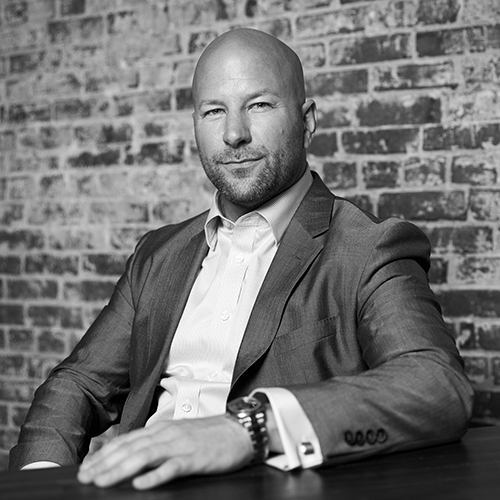Mark Rubinoff has been into motorcycles for more than fifteen years. Seven years ago, he bought his first full-size bike, and he’s been taking short trips around Pennsylvania ever since. His longest ride was a six-hour trek to catch an IndyCar race in New York.
When he’s not cruising around Philadelphia, Rubinoff can usually be found at Thomas Jefferson University (TJU). He joined the school and its affiliate, Jefferson Health, in 2014 to participate in the medical center’s transition to electronic medical records (EMRs). Rubinoff was brought in to negotiate the licensing and usage terms for all of the elements involved in the project. It was not an insignificant task, considering he started with nothing more than a binder stuffed with hundreds of pages detailing the organization’s digital wish list. In a little more than two years, he was able to bring the center’s ambulatory services online this past January. At the time of publication, he hopes to have launched the inpatient services aspect—a goal originally slated for July 2017.
The Latest Experiment
Neither a believer nor a critic, special counsel for technology and intellectual property Mark Rubinoff is currently exploring the foray of Thomas Jefferson University (TJU) into Pennsylvania’s newly legalized medical marijuana industry. As the first health sciences university in the United States to provide research and support for medical marijuana, TJU will offer innovative educational and academic resources about the herb and its effect on overall health. Rubinoff’s first concern is establishing the criteria and training for the certifications needed for Pennsylvania physicians to dispense the drug, yet another new venture on the horizon.
Engineer, Technology Expert, Lawyer
As special counsel for technology and intellectual property, Rubinoff is uniquely qualified to bring TJU’s records management into the twenty-first century. With training as an electrical engineer, Rubinoff spent part of his bachelor’s degree programming the punch cards that were then business as usual for computer science studies. “I really loved it,” he recalls. “I even took classes in the summers, if that doesn’t make me sound too geeky.” After he graduated, Rubinoff spent a few years selling computer components and educating customers about the high commercial value of computers and their programming capabilities, then-unknown quantities due to the relative newness of the digital age.
Coming from a family of lawyers, Rubinoff also noted that proper licensing and protection of software products were as necessary to their success as their capacities, so he went to law school in pursuit of that skill set. Nine subsequent years of negotiating technology and commercial agreements in the financial sector gave him front-end experience in innovating technology to meet enterprise goals, regardless of their location in any one industrial vertical. The shift in America’s healthcare industry to “all-digital, all the time” opened the door to taking his one-of-a-kind knowledge base to where it was needed most, so he chose TJU and Jefferson Health as his first foray into the healthcare technology field.
New Tools
Bringing the center online was an immense project. The facility was replacing its existing electronic medical record system, which included more than a hundred separate software agreements. Rubinoff was learning the nuts and bolts of the healthcare industry, a formidable challenge in and of itself. His discussions involved all facets of all of TJU’s existing and future facilities, including product vendors, internal systems management, compliance departments, technology capacities, liabilities, and more. Perhaps most importantly, the end product had to maintain the integrity of and respect for each of TJU’s foundational pillars of excellence: academic, clinical, philanthropic, and innovative. It took five months to negotiate the revised system to a launch position and another eighteen months to achieve an implementation stage.
During the process, Rubinoff’s biggest challenge was working with the medical professionals—not because they were difficult, but because some of them had to learn to articulate their needs. Luckily, Rubinoff’s ability to speak the language of the engineers, software designers and developers, and legal staff proved to be a highly valuable shortcut. He negotiated the agreements between the center and its new technology vendors and suppliers, and then he brought those services online to improve all aspects of the facility, including how it delivers, records, and reports its healthcare activities.
Keeping Things Safe
Rubinoff’s legal background also proved fortuitous regarding technology security and conversations about liability. The center’s comprehensive training ran for months before the launch, ensuring that staff knew from the start what they were doing, which reduced liability risks. The hospital’s in-house technology security team was also intimately involved in developing and rolling out processes from day one, and they worked well with Rubinoff’s deep knowledge of digital security trends and realities. The final EMR system—at least for now—uses a combination of on-premises and cloud configurations to facilitate, protect, and store the thousands of digital interactions that occur at the school and health center every day.
Rubinoff is aware that digital vulnerabilities and their subsequent liabilities are a constant threat. Accordingly, all large data-sharing projects go through him first so that he can vet for access, ancillary usage rights, and other licensing and liability challenges. His team of more than fifteen lawyers focuses on the center’s other legal oversight requirements, including patenting of in-house innovations, human resources, and regulatory compliances, among others.
New Horizons
In addition to the in-house advancements, Rubinoff is always on the lookout for new technologies, services, and other tools to enhance the medical facility’s capacity to serve its community. He sees the user experience as an emerging element of the EMR system and predicts that artificial intelligence will play a pivotal role in delivering future health services; he expects to be making deals for those services sooner rather than later.
A self-described renaissance man, Rubinoff enjoys the flexibility and adventure of his position at Thomas Jefferson University – Jefferson Health and is eager to explore new technical and medical trends on the horizon. In the meantime, he’s also trying to schedule a week-long junket on his newest motorbike. From behind those handlebars, he’s eager to finally explore the expanse of America’s wide horizons, too.
Cozen O’Connor provides comprehensive IP portfolio counseling and guides clients from conception to issuance to enforcement. We represent corporate clients from startups to multinational companies and handle all types of intellectual property—patents, trademarks, trade names, domain names, service marks, trade dress, copyrights, trade secrets, and rights of publicity and privacy.

